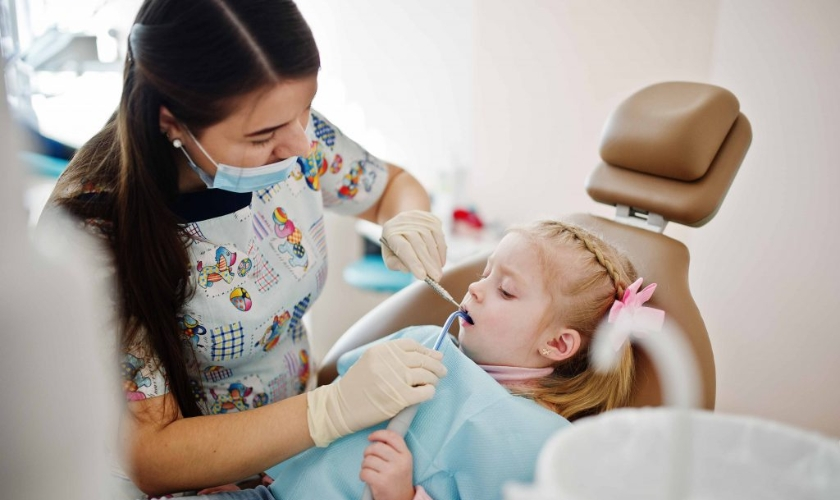Dental care is essential for everyone, but it is especially important for children. Starting dental care early in life helps ensure a child's overall health and well-being. Establishing good habits from the beginning can significantly impact the development of their teeth and gums, leading to a lifetime of healthy smiles. Early intervention plays a critical role in preventing future dental problems, which can affect a child's self-esteem, ability to eat, and overall health.
By incorporating regular checkups and a proper oral hygiene routine from an early age, parents can set their children on the path to excellent dental health. The involvement of a pediatric dentist(طبيب أسنان الأطفال) ensures that any dental concerns are addressed as early as possible.
Setting the Foundation for Healthy Habits:
The first few years of a child’s life are a critical period for developing habits that last a lifetime. When it comes to dental care, good habits can be established early by introducing children to proper brushing and flossing routines. Teaching children to brush their teeth twice a day with fluoride toothpaste and to use a soft-bristled toothbrush can help prevent cavities and other dental problems.
Moreover, the earlier a child is introduced to these habits, the more likely they are to maintain them as they grow. Encouraging your child to brush their teeth and make it fun can build a positive relationship with dental hygiene.
Preventing Early Tooth Decay:
Tooth decay is one of the most common childhood diseases, yet it is highly preventable with early care. Baby teeth may eventually fall out, but they serve as placeholders for adult teeth, making them crucial for proper mouth development. Early dental visits allow a pediatric dentist to monitor the health of these teeth and identify any signs of decay or other issues before they become significant problems.
Additionally, early visits can help detect misalignment, cavities, or thumb-sucking habits that could impact the development of permanent teeth. Preventative measures, such as fluoride treatments, can be performed by the dentist to help strengthen the teeth and reduce the risk of decay.
Building Trust in the Dental Environment:
The earlier a child begins seeing a dentist, the more comfortable they will be in a dental setting. Children who visit a dentist early are less likely to experience dental anxiety later in life. Positive early experiences set the tone for future dental appointments, helping children build trust and learn that going to the dentist is a normal and safe activity.
Creating a positive relationship with dental visits at a young age also allows the child to feel more comfortable when facing potential dental treatments in the future. This can lead to better cooperation and reduced fear during dental procedures.
Addressing Speech and Developmental Concerns:
Teeth play a significant role in the development of speech, as they aid in the articulation of certain sounds. Dental problems, such as early tooth loss or misalignment, can affect a child's ability to speak clearly. Early dental checkups allow a pediatric dentist to spot these issues and intervene before they become more challenging to address.
Additionally, early intervention can help prevent issues such as crowding, spacing, or bite problems that can impact the growth of a child’s mouth. Aligning the teeth early on can ensure that speech development continues smoothly, and children avoid difficulties later on.
Nutrition and Dental Health:
Diet plays an essential role in a child's dental health, and early dental care can provide guidance on maintaining a healthy diet to support oral health. Foods high in sugar and acids can contribute to tooth decay and enamel erosion. A pediatric dentist can provide advice on which foods promote healthy teeth and which should be limited to prevent damage.
By teaching children healthy eating habits, parents can significantly reduce the risk of dental problems such as cavities. Limiting sugary snacks and beverages and emphasizing fruits, vegetables, and calcium-rich foods can help maintain strong teeth and gums.
Managing Habits that Impact Oral Health:
Certain childhood habits, such as thumb sucking, pacifier use, or teeth grinding, can affect dental health and development. Early dental care provides an opportunity for parents to address these habits before they cause long-term damage to the teeth or jaw.
A pediatric dentist can offer advice on how to gently guide children away from habits that may be harmful to their dental health. For instance, they may recommend alternatives to pacifiers or strategies to reduce the effects of teeth grinding.
Conclusion: The Lasting Benefits of Early Dental Care
The importance of early dental care cannot be overstated. By starting dental visits at an early age and promoting good oral hygiene practices, children can enjoy healthier teeth, a more confident smile, and fewer dental problems as they grow. Regular visits to a pediatric dentist provide a strong foundation for a child’s oral health, helping to ensure their teeth develop properly, stay strong, and function well throughout life. Early intervention is not just about treating dental issues—it’s about preventing them and establishing lifelong dental habits that can make a significant difference.






Comments